|
|
|
Sort Order |
|
|
|
Items / Page
|
|
|
|
|
|
|
| Srl | Item |
| 1 |
ID:
107147
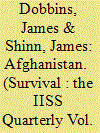

|
|
|
|
|
| Publication |
2011.
|
| Summary/Abstract |
The overarching Western objective in Afghanistan should be to prevent that country from becoming not just a haven for transnational terrorists, but a terrorist ally as well. That was the situation prior to 9/11 and it would be so again if the Taliban returned to power with al-Qaeda backing. NATO can prevent this indefinitely as long as it is willing to commit significant military and economic resources to a counter-insurgency effort. It cannot eliminate the threat, however, as long as the Afghan insurgents enjoy sanctuary in and support from Pakistan. Alternatively, this objective could be achieved if the Taliban could be persuaded to cut its ties to al-Qaeda and end its insurgency in exchange for some role in Afghan governance short of total control.
|
|
|
|
|
|
|
|
|
|
|
|
|
|
|
|
| 2 |
ID:
107149
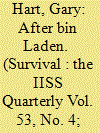

|
|
|
|
|
| Publication |
2011.
|
| Summary/Abstract |
The Cold War ended 20 years ago. NATO has yet to define a twenty-first- century mission. New allies and new rivals are emerging. There are new security threats that do not lend themselves to military response and that cannot be addressed either by old alliances or by the United States alone, and the nature of warfare and the character of conflict themselves are changing. The United States' national predisposition, however, has been to rely on traditional institutions and policies and to use them to address unfolding history on its own timetable.
|
|
|
|
|
|
|
|
|
|
|
|
|
|
|
|
| 3 |
ID:
107148
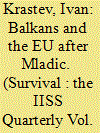

|
|
|
|
|
| Publication |
2011.
|
| Summary/Abstract |
Ten years after the last war in the region, the Balkans is still an assemblage of frustrated protectorates and weak states. Bosnia and Kosovo are trapped in the labyrinthine politics of semi-independence; Albania, Macedonia and Montenegro are small and claustrophobic republics with populist and divisive governments and opposition forces that are discouraged and discouraging at the same time. Serbia has not yet made up its mind how to reconcile its position on Kosovo with its aspiration to join the European Union. Croatia has succeeded in its accession talks with the EU, which closed on 30 June 2011, but the mood of the public is dire due to mismanagement and corruption scandals. The Balkans currently reflects a mixture of Greek-style economic problems, Berlusconi-style politics and Turkish-level hopes when it comes to joining the EU. With Italy and Greece facing deep political and economic troubles of their own, the Balkans has lost its natural advocates for EU membership.
|
|
|
|
|
|
|
|
|
|
|
|
|
|
|
|
| 4 |
ID:
107153
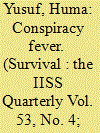

|
|
|
|
|
| Publication |
2011.
|
| Summary/Abstract |
The 2 May 2011 US special-forces raid on al-Qaeda leader Osama bin Laden's compound in Abbottabad marked a low point in already strained US-Pakistan relations. Although Washington provides more than $1 billion in annual aid to Islamabad, divergent strategic interests with regard to Afghanistan have caused friction between the allies, and many Pakistanis resent that they are on the front line of America's war against terrorism (over 4,300 civilians have been killed in terrorist attacks across Pakistan since 2007). This tension manifested on 14 May, when, in response to the Abbottabad raid, a joint session of both houses of the Pakistani parliament passed a unanimous resolution to defend the country's sovereignty, security and territorial integrity against US military actions.
|
|
|
|
|
|
|
|
|
|
|
|
|
|
|
|
| 5 |
ID:
107157
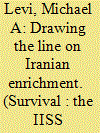

|
|
|
|
|
| Publication |
2011.
|
| Summary/Abstract |
How much Iranian nuclear capability is too much? The simplest answer is that any amount is unacceptable. By learning how to enrich uranium, Iran has given itself the potential to eventually produce enough weapons-grade material for one or more atomic bombs. That risk can only be removed if all Iranian enrichment programmes are eliminated. This belief has long been a mainstay of US rhetoric, if not policy, towards Iran.
But it is far from clear that zero enrichment is a realistic goal. Indeed, despite recent setbacks, Iran's leaders appear determined to continue improving and expanding Iran's enrichment programme; they may even have already decided to eventually build a bomb. The important question, then, is how much Iranian nuclear capability is too much, given the limited (and often costly) options available for curbing Iran.
|
|
|
|
|
|
|
|
|
|
|
|
|
|
|
|
| 6 |
ID:
107154
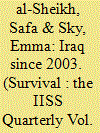

|
|
|
|
|
| Publication |
2011.
|
| Summary/Abstract |
The US-led invasion of Iraq in 2003 had a traumatic effect on Iraqi society, causing it to break down into different armed groups that at times fought the US-led Coalition, the new government, members of other sects and even members of the same sect in a nation-wide conflict that claimed the lives of well over 100,000 Iraqis. While this violence has since decreased, Iraq's stability gains remain fragile, and the country's future is uncertain. To understand why there was so much violence in Iraq after 2003, and why the violence eventually decreased, it is important to examine the contending perspectives of the different groups, in particular Sunni insurgents, the central government in Baghdad and the followers of Shia leader Moqtada al-Sadr (known as Sadrists).
|
|
|
|
|
|
|
|
|
|
|
|
|
|
|
|
| 7 |
ID:
107150
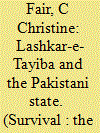

|
|
|
|
|
| Publication |
2011.
|
| Summary/Abstract |
Lashkar-e-Tayiba (LeT) is the most lethal terrorist group operating from South Asia. Founded in 1989 in Afghanistan with help from Pakistan's Inter-Services Intelligence (ISI), it began operations in India in 1990. Until November 2008, US policymakers tended to dismiss LeT as India's problem, despite the fact that the group had been attacking US troops and their international and Afghan allies in Afghanistan. On 26 November 2008, however, LeT made its debut as an international terrorist organisation when it launched a four-day siege of India's port city of Mumbai. In that attack, 166 people perished, including several Americans and Israelis. This was the first time that LeT had targeted non-Indian civilians. Recent revelations that David Coleman Headley, an American citizen of Pakistani origin, conspired with LeT (and, allegedly, a Pakistani army major deputed to the ISI) to launch the Mumbai offensive have stoked fears about American home-grown terrorism and the ability of LeT to attack the US homeland. Headley's ties to an al-Qaeda leader, Ilyas Kashmiri, have furthered speculation about LeT's ties to al-Qaeda. Rightly or wrongly, some American officials believe it is only a matter of time beforeLeT will launch an attack on US soil.
|
|
|
|
|
|
|
|
|
|
|
|
|
|
|
|
| 8 |
ID:
107151
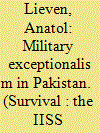

|
|
|
|
|
| Publication |
2011.
|
| Summary/Abstract |
Since Pakistan achieved independence in 1947, the country's military has governed the country outright three times and exerted a strong political influence even when not in power.Pakistan's tradition of military dominance stems above all from the fact that the Pakistani military is the only institution that works more or less as it is meant to, as measured against the generally accepted standards of a modern state institution. This creates the belief among some sections of Pakistan's population that the efficiency displayed by the military within its own sphere can be extended via military government to the working of the state as a whole. This belief, however, is a mistake. Each time the military takes over the entire Pakistani system, it soon finds that the state is so weak that it has no choice but to work through the same old local elites, using the familiar methods of patronage, corruption and exploitation of kinship ties.
|
|
|
|
|
|
|
|
|
|
|
|
|
|
|
|
| 9 |
ID:
107156
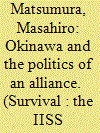

|
|
|
|
|
| Publication |
2011.
|
| Summary/Abstract |
The problem of whether a US Marine Corps air base in Okinawa (Futenma Air Station) should be relocated to a new facility or moved off the island entirely has been a fishbone in the throat of the Japan-US alliance. Okinawa's location makes it a strategic asset for US regional and global military strategy: the island provides easy access to the Korean Peninsula and the Taiwan Strait and serves as a crucial hub of America's global military network of bases and facilities.
|
|
|
|
|
|
|
|
|
|
|
|
|
|
|
|
| 10 |
ID:
107152
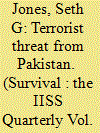

|
|
|
|
|
| Publication |
2011.
|
| Summary/Abstract |
With the death of Osama bin Laden and the emergence of the Arab Awakening, it has become de rigueur to argue that the primary terrorist threat to the West now comes from the Arabian Peninsula or North Africa. 'For the first time since the Sept. 11, 2001, attacks', extolled a Washington Post article after interviews with senior US government officials, 'CIA analysts see one of al-Qaeda's offshoots [in Yemen] - rather than the core group now based in Pakistan - as the most urgent threat to US security.' Some have even argued that al-Qaeda itself is increasingly irrelevant. 'Basically, we are winning dramatically', remarked Marc Sageman, a terrorism specialist and former CIA officer. 'You have an organization which is a shadow of its former self. We have got to the point where the real danger is from lone wolves who decide by themselves to turn violent.' US President Barack Obama joined in the chorus, triumphantly stating that 'we have put al-Qaeda on a path to defeat' because of the death of bin Laden and other senior operatives. In short, there appears to be a wave of triumphalism across the West that al-Qaeda and its allies are on the wane, and that the terrorist threat to the West has shifted away from Pakistan.
|
|
|
|
|
|
|
|
|
|
|
|
|
|
|
|
| 11 |
ID:
107155
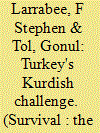

|
|
|
|
|
| Publication |
2011.
|
| Summary/Abstract |
Turkey has been wrestling with its Kurdish issue since the foundation of the republic in 1923. The early 'Turkification' policy of the Kemalist elite met strong resistance among the Kurdish minority and sparked several outbreaks of unrest, violently suppressed, in the Kurdish areas in the east and southeast. In 1984 the issue took on a new dimension when the newly founded Kurdistan Workers' Party (PKK) began conducting terrorist attacks against Turkish territory from safe havens in the Qandil Mountains of northern Iraq. The struggle against the PKK has so far cost 40,000 lives and has hurt both Turkey's internal development and its relations with its Western allies, especially the United States.
|
|
|
|
|
|
|
|
|
|
|
|
|
|
|
|
|
|
|
|
|